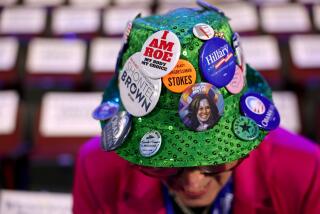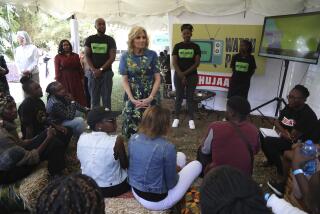Mrs. Clinton Attacks Coerced Sterilization
- Share via
BEIJING — In her first public appearance at the U.N. Fourth World Conference on Women here today, First Lady Hillary Rodham Clinton lashed out at government-coerced sterilization and abortions that are practiced widely in China and other developing countries.
Mrs. Clinton, speaking before a forum on women’s health at the conference, did not mention China or any other country by name.
But her comments echoed those of many critics of China’s family planning programs who claim that abortion and sterilization are used as government-sponsored birth-control techniques, often against the will of women.
“Women and men must also have the right to make those most intimate of all decisions free of discrimination, coercion and violence, particularly any coercive practices that force women into abortions or sterilizations,” Mrs. Clinton said.
The comments are likely to please factions of the U.S. Congress which have urged Mrs. Clinton to use the Beijing conference as a platform to condemn human rights abuses. U.S. Rep. Christopher H. Smith (R-N.J.), a leading anti-abortion member of Congress, held a news conference Monday in Beijing at which he called for Mrs. Clinton to make just such a condemnation.
However, in her nine-page remarks before the women’s health forum, Mrs. Clinton also called for increased access to health care and family planning services for the world’s women.
“One hundred million women cannot obtain or are not using family planning services because they are poor, uneducated or lack access to care,” Mrs. Clinton said, using language likely to please those on the other side of the abortion debate. “Twenty million of these women will seek unsafe abortions--some will die, some will be disabled for life.”
Mrs. Clinton was interrupted several times by applause during her address.
Smith, joining the 44-member U.S. delegation, has accused the Chinese of conducting thousands of “forced abortions and forced sterilizations” as part of the country’s strict family planning program.
In congressional debate leading up to the conference, Smith led an unsuccessful effort to cut off funding for the U.S. delegation. After failing, he decided to join a four-member congressional delegation and has seized the opportunity to loudly condemn Chinese family planning policy.
At his news conference, Smith said: “The Chinese coercive population-control program has destroyed more than 150 million babies since 1979. . . . To attend a women’s rights conference in Beijing without commenting on this would be like attending a human rights conference in South Africa 10 years ago without condemning apartheid.”
However, the three other members of Congress visiting the conference--all women--urged a more moderate approach. “I came here to listen and learn, not to lecture,” said Rep. Jane Harman (D-Rolling Hills).
Earlier Monday, controversies over Chinese security gave way to debates over domestic and state violence against women as the conference officially opened.
Declaring that women “are no longer guests on this planet,” the conference’s secretary general, Gertrude Mongella of Tanzania, said that “this planet belongs to them too. A revolution has begun.”
Besides Mrs. Clinton, other prominent female leaders, including Pakistani Prime Minister Benazir Bhutto and Bangladeshi Prime Minister Khaleda Zia, arrived to try to create a new foundation for women’s advancement.
But despite the enthusiasm, the conference, which continues until Sept. 15, heralds less a revolution than a holding pattern. Delegates are digging in to preserve positions on abortion and sex education that were agreed on last year at the U.N. Conference on Population and Development in Cairo.
“There will be no unraveling of commitments--neither today’s nor last year’s, and certainly not this decade’s commitments,” said Mongella. “This revolution is too just, too important and certainly long overdue.”
Before Mongella and others spoke inside the Great Hall of the People in Beijing during welcoming ceremonies, South African representative Winnie Mandela and her entourage were turned away because they arrived late. An ensuing clash with guards who shoved them from the steps of the building was the first example in the capital of the kind of confrontations between hyper-cautious security forces and activist women that have plagued a parallel forum outside the city.
Some participants at the Non-Governmental Organizations Forum on Women outside Beijing have complained of being harassed by police.
On Monday, nearly 1,000 women dressed in black and carrying candles scuffled with police three times as they marched to the edges of the forum site to protest violence and discrimination against women and the United Nations’ failure to back up their right to demonstrate there without interference.
More to Read
Sign up for Essential California
The most important California stories and recommendations in your inbox every morning.
You may occasionally receive promotional content from the Los Angeles Times.













